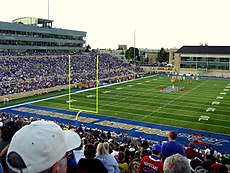Skelly Field at H. A. Chapman Stadium
| Skelly Stadium | |
 |
|
| Former names | Skelly Field (1930–1947) Skelly Stadium (1947–2007) |
|---|---|
| Location | 3112 East 8th Street, Tulsa, Oklahoma |
| Coordinates | 36°8′55″N 95°56′38″W / 36.14861°N 95.94389°WCoordinates: 36°8′55″N 95°56′38″W / 36.14861°N 95.94389°W |
| Owner | University of Tulsa |
| Operator | University of Tulsa |
| Capacity | 30,000 (2008–present) 35,542 (2005–2007) 40,385 (1965–2004) 19,500 (1947–1964) 14,500 (1930–1946) |
| Surface | Grass 1930 to 1971 Tartan Turf 1972 to 1981 Astroturf 1982 to 1990 Stadia Turf 1991 to 1999 FieldTurf 2000 to present |
| Construction | |
| Broke ground | May 11, 1930 |
| Opened | October 4, 1930 |
| Construction cost | $275,000 (all in tax money) (approximate, original) ($3.94 million in 2016 dollars) |
| Architect | Smith & Senter Architects |
| Tenants | |
|
Tulsa Golden Hurricane (NCAA) (1930–present) Tulsa Roughnecks (NASL) (1978–1984) Oklahoma Outlaws (USFL) (1984) Tulsa Tornados (USL) (1985) |
|
Skelly Field at H. A. Chapman Stadium (often shortened to HA Chapman Stadium) is a football stadium located on the campus of the University of Tulsa in Tulsa, Oklahoma. It is primarily the home of the Tulsa Golden Hurricane football team. The stadium currently seats 30,000.
Skelly Field (as it was originally known) was built in 1930 as a 14,500-seat stadium. It was named for its primary benefactor, William Skelly, the founder of Skelly Oil. Tulsa defeated Arkansas 26–6 at the opening game on October 4, 1930.
In 1947 the north stands were added and the stadium was renamed Skelly Stadium. In 1965, the track was removed, the field was lowered, the west stands were expanded and the south stands were added, bringing the total capacity to 40,385 seats. In February 2005, the north stands were demolished to make way for the new Case Athletic Complex, reducing the seating capacity to 35,542. In 2007–2008, the stadium was renovated, reducing capacity to 30,000
The stadium, located on historic U.S. Route 66, hosted the Oklahoma Outlaws of the USFL in 1984. Skelly was once the principal home field for two American football legends – future NFL Hall-of-Famer (and later U.S. Congressman) Steve Largent when he played for the University of Tulsa and Doug Williams of the Oklahoma Outlaws, who later was a Super Bowl MVP for the Washington Redskins. The stadium was also home to the Tulsa Roughnecks of the North American Soccer League 1978–1984 and the short-lived Tulsa Mustangs of the AFA.
...
Wikipedia
